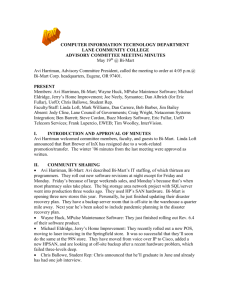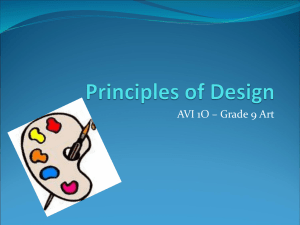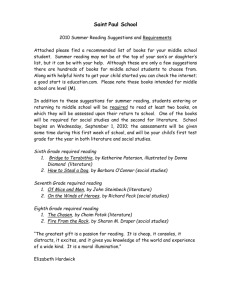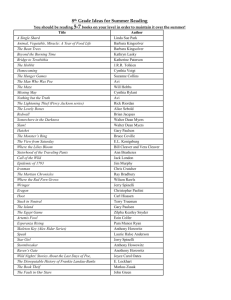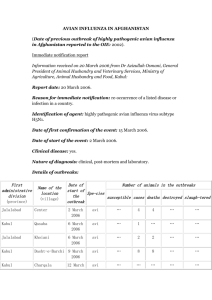Winter 2006
advertisement
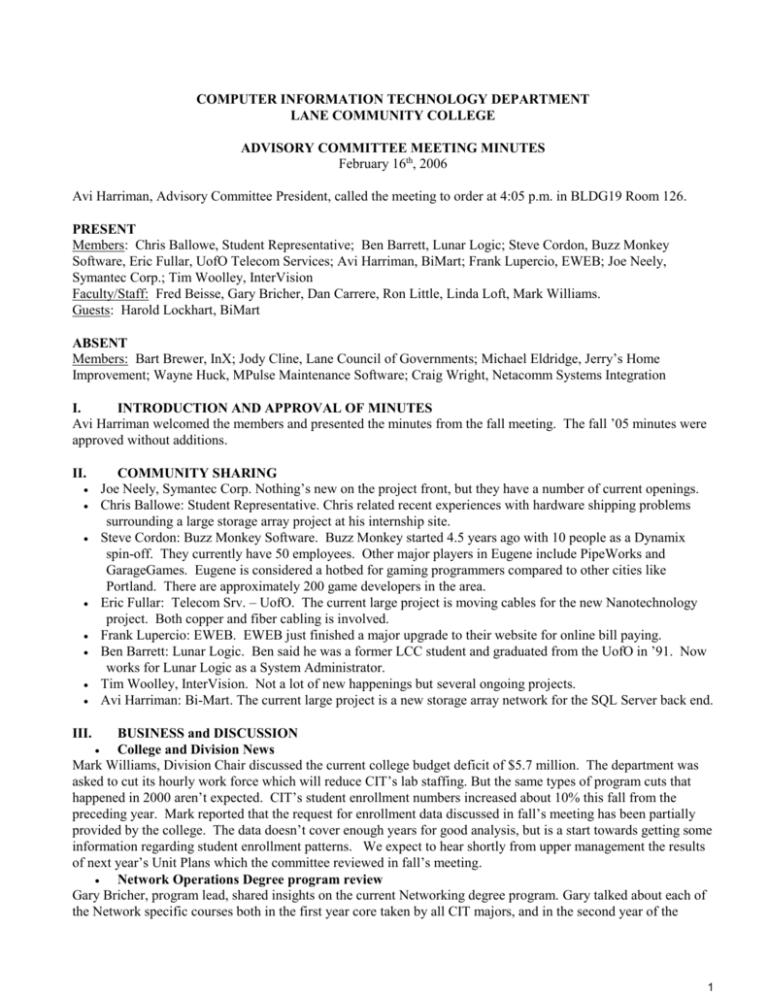
COMPUTER INFORMATION TECHNOLOGY DEPARTMENT LANE COMMUNITY COLLEGE ADVISORY COMMITTEE MEETING MINUTES February 16th, 2006 Avi Harriman, Advisory Committee President, called the meeting to order at 4:05 p.m. in BLDG19 Room 126. PRESENT Members: Chris Ballowe, Student Representative; Ben Barrett, Lunar Logic; Steve Cordon, Buzz Monkey Software, Eric Fullar, UofO Telecom Services; Avi Harriman, BiMart; Frank Lupercio, EWEB; Joe Neely, Symantec Corp.; Tim Woolley, InterVision Faculty/Staff: Fred Beisse, Gary Bricher, Dan Carrere, Ron Little, Linda Loft, Mark Williams. Guests: Harold Lockhart, BiMart ABSENT Members: Bart Brewer, InX; Jody Cline, Lane Council of Governments; Michael Eldridge, Jerry’s Home Improvement; Wayne Huck, MPulse Maintenance Software; Craig Wright, Netacomm Systems Integration I. INTRODUCTION AND APPROVAL OF MINUTES Avi Harriman welcomed the members and presented the minutes from the fall meeting. The fall ’05 minutes were approved without additions. II. COMMUNITY SHARING Joe Neely, Symantec Corp. Nothing’s new on the project front, but they have a number of current openings. Chris Ballowe: Student Representative. Chris related recent experiences with hardware shipping problems surrounding a large storage array project at his internship site. Steve Cordon: Buzz Monkey Software. Buzz Monkey started 4.5 years ago with 10 people as a Dynamix spin-off. They currently have 50 employees. Other major players in Eugene include PipeWorks and GarageGames. Eugene is considered a hotbed for gaming programmers compared to other cities like Portland. There are approximately 200 game developers in the area. Eric Fullar: Telecom Srv. – UofO. The current large project is moving cables for the new Nanotechnology project. Both copper and fiber cabling is involved. Frank Lupercio: EWEB. EWEB just finished a major upgrade to their website for online bill paying. Ben Barrett: Lunar Logic. Ben said he was a former LCC student and graduated from the UofO in ’91. Now works for Lunar Logic as a System Administrator. Tim Woolley, InterVision. Not a lot of new happenings but several ongoing projects. Avi Harriman: Bi-Mart. The current large project is a new storage array network for the SQL Server back end. III. BUSINESS and DISCUSSION College and Division News Mark Williams, Division Chair discussed the current college budget deficit of $5.7 million. The department was asked to cut its hourly work force which will reduce CIT’s lab staffing. But the same types of program cuts that happened in 2000 aren’t expected. CIT’s student enrollment numbers increased about 10% this fall from the preceding year. Mark reported that the request for enrollment data discussed in fall’s meeting has been partially provided by the college. The data doesn’t cover enough years for good analysis, but is a start towards getting some information regarding student enrollment patterns. We expect to hear shortly from upper management the results of next year’s Unit Plans which the committee reviewed in fall’s meeting. Network Operations Degree program review Gary Bricher, program lead, shared insights on the current Networking degree program. Gary talked about each of the Network specific courses both in the first year core taken by all CIT majors, and in the second year of the 1 Network program. The department prioritized the Firewall Security curriculum at the top of its Unit Plan for next year. Projected curriculum development on wireless courses was given a lower Division priority, although they are strategizing other methods to also accomplish them. Ben Barrett recommended Hal Pomerantz as an excellent contact for Storage Array Network training. He also recommended the use of Regular Expressions be taught in the curriculum. Gary said that although previously taught, the current CIS140U text wasn’t covering it. Faculty Announcements Ron Little said CS284 Network Security Fundamentals did not have enough students sign up this term but will be taught winter ’07. Mark Williams mentioned packaging some security courses into a mini-certificate. Harold Lockhart thought that would be a great idea and worth coming back to take the courses. Avi Harrison spoke that for an IT manager mini-certificates would be useful for both employee evaluations and justifying promotions. Fred Beisse expressed appreciation for the Project Management curriculum feedback and said the course currently has fifteen students. Four are professionals from the IT community and the rest are CUS degree-seeking students. He talked about the five project groups and two spin-off workgroups, one on MS/Project and the other preparing for a professional project management exam. Ben Barrett recommended publicizing it as a PM refresher course or part of a mini-certificate. He felt that many current project managers need this type of course, but believe they are beyond an introductory PM course. Fred Beisse requested entry-level job position descriptions for IT positions. This would be very useful for the CIS100 Computer Careers course as well as others. Avi Harriman suggested emailing the request to all Advisory Board members, which they could then forward to their Human Resource departments. Mix of Credit/non-credit CIT classes for working professionals. Mark Williams presented a proposal for cross-listing credit and non-credit CIT classes, where class sizes might grow to fill under-utilized space in our courses. Ron Little asked for feedback on scheduling timeframes for working people. Most people agreed that a concentrated, full-day, 3-day format was the best option. Employers will give release time and pay for an intensive style of training, but regular term courses would be on employees own time. Avi Harriman suggested emailing a checklist of possible classes where Advisory members could give feedback on those they felt were viable. Chris Ballowe asked if this would deplete funds from the credit classes. Avi suggested that non-credit students might become credit students after taking a few classes. Joe Neely asked about the cost difference between them. Mark gave a rough estimate of non-credit at about half the tuition cost. Eric Fullar asked about the possibility of renting classrooms to other IT groups which provided their own instructors. Joe suggested renting to private training agencies any under-utilized space for 3-day workshops. People were reminded that the rooms were being utilized throughout the week, just not to the current holding capacity. Avi spoke to the difference between regular academic instruction and business-oriented professional training. He said besides no testing, there are concentrated materials that a person can refer to later. And the purpose of these classes is to provide an overview so that one knows a real solution for a problem exists. Public Relations problem for IT Fred Beisse discussed the Gartner Group report concerning the 60% drop of Computer Science majors over the last five years due to concerns of outsourcing and the dot.com bust. He asked the group to come up with ideas to change the public’s perception about IT. Joe Neely said they can’t find enough qualified people. Avi Harriman said they ramped up personnel for Y2K, and then had a glut of IT people which have gradually been absorbed with the last few open positions. Joe mentioned that Monster.com is the place to estimate the need for IT personnel, not the Register Guard ads. Eric Fullar commented that there are so many other degrees (Music, Art, Cartography, etc.) which now have fair amount of computing within them, so perhaps students are choosing more applied approaches to computing. Joe asked if the private technical schools are taking students away. Daniel Carrere responded yes to a degree, but those students are usually financed by Voc Rehab or other agencies with specific funding and time limits which don’t fit academic environments. He also mentioned some private colleges such as NWCC have developed articulation pathways with these private technical schools. Ben Barrett suggested that students need to see independent contract work as a viable employment opportunity. Outsourcing works both ways, with Eugene being a place where lots of independent contractors work. Even large companies like Lunar Logic get programming contracts from other cities and countries. Gary suggested that information be included in the CIS100 Computing Careers course. 2 Committee Working Ideas and Goals Faculty Tours: Joe Neely is sponsoring a faculty tour Feb. 17th at Symantec and several faculty are participating. Both Avi Harriman and Ben Barrett volunteered to sponsor faculty tours of their companies. Meeting Time: Avi Harriman suggested that the next meeting be changed to a lunch hour meeting. Linda Loft mentioned it might be difficult for faculty schedules unless scheduled on Friday. Linda agreed to survey the Advisory members about changing the May 18th meeting to Friday May 19th. Avi volunteered to host the committee at BiMart. Meeting Room: It was agreed that the current room 126 was better for the size of the committee. More Student involvement: Chris Ballowe suggested having a student from each of the CIT programs. Student focus groups on courses and curriculum: Avi Harriman asked about the status of student computer groups. Ron Little informed him that there had been several clubs in the past, but currently just informal groups. Joe Neely asked if a survey of former students had been considered. Mark Williams expressed that was a topic of the last faculty meeting. Ben Barrett suggested instructional projects designed for involvement by both first and second year students across multiple majors as a method for forming student groups. Gary Bricher voiced that Lane has that type of mechanism called Learning Communities. Monthly working groups: This was suggested as a spin-off of the Board’s meetings. Avi suggested an informal lunch discussion, the 2nd Monday of each month starting Mar. 13th at Quan’s restaurant at Broadway and Olive, – all Advisory members invited. Students would also be included. Linda Loft asked about the mechanism for including students and would they need to RSVP. It was suggested that a subset of students be included and then rotated monthly. Ben Barrett asked if the faculty would decide on the subset and create a sign-up sheet for students. That way they’d know how many tables should be reserved. Committee alternates: There was a general endorsement for sending another company employee as a guest if one could not attend a regularly scheduled Board meeting. All members were thanked for their attendance and the meeting adjourned at 5:55 p.m. The next meeting will be Friday, May 19th at BiMart, pending survey of all advisory members. Respectfully Submitted, Linda Loft Committee Coordinator Copies: Advisory Committee Members, Mark Williams, Interim Division Chair, Computer Information Technology Patrick Lanning, AVP for Instruction, OISS 3
